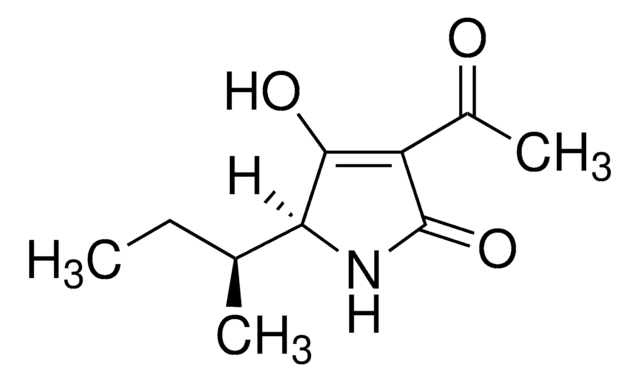F9054
Fumitremorgin C
from Neosartorya fischeri, film
Synonym(s):
FTC
About This Item
Recommended Products
biological source
Neosartorya fischeri
Quality Level
form
film
solubility
acetonitrile: soluble 5 mg/mL
methanol: soluble 5 mg/mL
DMSO: soluble
chloroform: soluble
antibiotic activity spectrum
fungi
shipped in
wet ice
storage temp.
2-8°C
SMILES string
COc1ccc2c3C[C@@H]4N([C@@H](\C=C(/C)C)c3[nH]c2c1)C(=O)[C@@H]5CCCN5C4=O
InChI
1S/C22H25N3O3/c1-12(2)9-18-20-15(14-7-6-13(28-3)10-16(14)23-20)11-19-21(26)24-8-4-5-17(24)22(27)25(18)19/h6-7,9-10,17-19,23H,4-5,8,11H2,1-3H3/t17-,18-,19-/m0/s1
InChI key
DBEYVIGIPJSTOR-FHWLQOOXSA-N
General description
Application
Biochem/physiol Actions
Features and Benefits
Packaging
Storage Class Code
11 - Combustible Solids
WGK
WGK 3
Flash Point(F)
Not applicable
Flash Point(C)
Not applicable
Personal Protective Equipment
Certificates of Analysis (COA)
Search for Certificates of Analysis (COA) by entering the products Lot/Batch Number. Lot and Batch Numbers can be found on a product’s label following the words ‘Lot’ or ‘Batch’.
Already Own This Product?
Find documentation for the products that you have recently purchased in the Document Library.
Customers Also Viewed
Our team of scientists has experience in all areas of research including Life Science, Material Science, Chemical Synthesis, Chromatography, Analytical and many others.
Contact Technical Service










